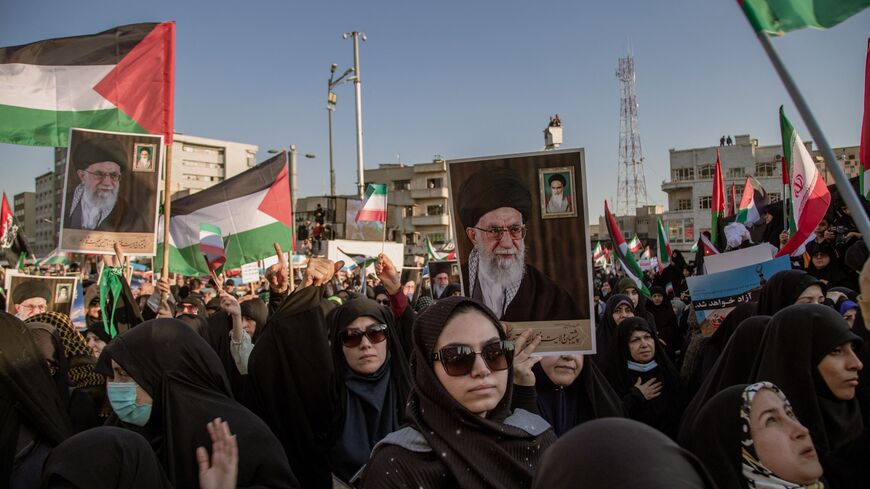
The commander of Iran's Islamic Revolutionary Guard Corps (IRGC) warned on Thursday that Gaza will "devour" Israel should the latter invade the densely populated coastal enclave controlled by Tehran-backed Hamas militants.
"Upon setting boots in Gaza, they will be buried there," declared Maj. Gen. Hossein Salami, using his signature anti-Israel rhetoric.
To the hard-line commander, the Hamas operation "was one of the most exceptional defeats ever suffered" by the United States, Great Britain and Israel. "They will be mistaken by thinking that the Muslim world will sit back watching them destroy part of the Islamic world," he warned.
Yet the IRGC chief refrained from speaking of any direct Iranian engagement, and followed Tehran's official line since Israel began pounding Gaza in response to Hamas' Oct. 7 onslaught in southern Israeli communities.
From the onset of the escalating conflict, Iranian diplomats and generals have warned that the "resistance front" — the moniker they apply to their proxies scattered across the region — will come into action if Israel launches a ground offensive into Gaza.
The rhetoric has in recent days been particularly redirected at the United States, as the "accomplice" in the Israeli bombardments of Gaza. Iran's Supreme Leader Ayatollah Ali Khamenei accused Washington of "managing the Zionist regime's crimes" in a speech in Tehran on Wednesday. Khamenei's remarks have been followed by a series of attacks on military bases hosting American forces in Syria and Iraq. Blaming them on Tehran-controlled Shiite militias, Washington has retaliated by hitting their IRGC-run bases.
In employing those proxies, Tehran seeks to shield itself from blame while advancing regional objectives. The attacks appear to operate within certain constraints, as a message that those proxies could complicate the calculations if the United States fails to dissuade Israel from invading Gaza.
Despite being controlled by hard-liners, caution has prevailed in past critical junctures in Iran's situation rooms. Protecting the establishment was the fundamental policy of the founder of the Islamic Republic, Ayatollah Ruhollah Khomeini.
Adhering to that approach, Khomeini's successor, Khamenei, has managed to keep wars at bay. His famous "heroic flexibility" gave the green light to moderate Iranian diplomats to clinch the 2015 nuclear deal with the West to forestall an imminent military conflict and economic collapse.
Also, when the United States killed his favored top general, Qasem Soleimani, in January 2020, Khamenei approved no direct war. He allowed only limited missile strikes on the US-run Ain al-Assad base in Iraq, leaving his loyalists wondering when the true revenge would be exacted.
On the same day as Khamenei's recent speech, US President Joe Biden told a press conference that he had warned the Iranian leader that "he has to be prepared" if Tehran continued to move against American troops.
Iran confirmed the messaging, but denied the tone. "The US messages were neither directed to the leader of the Islamic Revolution nor were they anything but requests from the Iranian side," declared Mohammad Jamshidi, a top aide to President Ebrahim Raisi, in a post on X. "If Biden thinks he has warned Iran, he should ask his team to show him the text of the messages."
Hamas gains sufficient for now
Hidden in the rhetoric coming from Tehran is a concern about an existential threat to the proxies it has nurtured for decades to promote its own survival.
The Hamas attacks have been hailed by the Islamic Republic as "strategic gains." Coming after a chain of Israel-blamed nuclear sabotage and assassinations inside Iranian territory, the deadly operation has been the "turning point" in Tehran's deep-running animosity with Tel Aviv.
An escalation of the conflict, by contrast, will mean that Hezbollah in Lebanon, the Houthis in Yemen and smaller yet diverse militia groups in Iraq and Syria will have to be dragged in. Their engagement in a potential war with Israel will also be a face-off with the world's most advanced military, the United States, protecting its most strategic ally in the Middle East.
Any such confrontation could deal massive blows to the Iranian proxies, which would not benefit Tehran at a moment it is celebrating the "absolute triumph." The Islamic Republic will, therefore, go to all lengths to maintain the current status, which it has gained without having to enter a devastating, direct war with its sworn enemy, Israel.
No comments:
Post a Comment